In his annual season-opening media address, Team President Brendan Shanahan discussed the team’s expectations for 2020-21, whether we could see fans in the stands at any point this season, the club’s offseason additions, and Auston Matthews’ development as a 200-foot player.
Brendan Shanahan’s Opening Statement
I would like to start off by recognizing and talking a little bit about my appreciation for all of the health care workers in our community — the front-line workers that have done so much for us over the last several months, and the risks that they take on every day. Extreme gratitude to them — not just on behalf of the Maple Leafs and players but from all of the community here in Toronto and Ontario. I just want to thank them for everything that they have done.
I am excited to start the NHL season. I think that it is something that people are excited about as well and looking forward to. At the end of every season, each management group will convene and talk about ways in which they can get better. One team, the Stanley Cup champion, meets and talks about how they can maintain their level of success. The rest of us are looking to improve and get better.
We did that over the course of the offseason, as do all NHL teams. When you look at some of the changes that were made — player acquisitions, and the messaging Sheldon has put out from the start of training camp to our players, talking about increased physicality, habits, competitiveness, and structure we will build from the first day of training camp and regular season — it is in the hope that you are laying the foundation for habits that Stanley Cup championship teams in the past all possess.
The regular season this year is important for all of us. It is going to be a sprint. It is a unique situation with the division we are all excited about here in Canada. For all of us trying to battle and position ourselves and lay down those habits in the regular season, it is all done with the intent of having success in the postseason as well.
Brendan Shanahan Q&A
Eugene Melnyk said this morning that the Senators have given a plan to the province to bring 6,000 fans into their building. Where do things stand with you guys and the province? Do you expect to have fans in Scotiabank Arena at any point this season?
Shanahan: I wasn’t in those conversations. I can’t speak for the Ottawa Senators or Eugene Melnyk, so I won’t. Those aren’t conversations we are having at this time. In Toronto, we are focused on getting started in Scotiabank Arena without fans present at the game.
In speaking to a lot of our fans, they are excited to be watching from home. We look forward to the day they are in the arena. One of the greatest points of when our fans are in the arena — one of the more important points — is that it is a reflection that our community as a whole is doing a whole lot better to have fans in a hockey arena.
When our fans are able to safely come back will be dictated by Toronto Public Health, the Ministry of Health for Ontario, and Health Canada. If and when that happens — when it happens — it will be a reflection of our community being in a much better place. I look forward to it for many reasons, but first and foremost, it will mean our community is in a much better place in handling Covid.
Many in the media are picking the Leafs to win the North Division. What has to happen for that to happen, do you think?
Shanahan: For us, and you have heard Sheldon and Kyle say this, we have goals like all NHL teams that come into this season aside from teams who are in stated rebuilds. We all have goals in the regular season. All teams are looking for the highest success. In order to do that, you focus on the day you are in that day.
What we are focused on are the things I brought up with Sheldon earlier. He identified a few things. It was his first full offseason as an NHL coach. He had a hand in some of the players that were brought in. He was specifically looking at some of the things he felt our team lacked and our team needed to improve on.
Obviously, there was also a focus on the players that were coming back and the growth of them as well as professionals — habits that we feel can bring you success in the regular season. You are not going to have 56 excellent games in a row, and every week is not going to be your best week. If you look back at past Stanley Cup champions, they don’t always have impeccable seasons without adversity at some point. We understand that and recognize that.
Sheldon’s message at the beginning of camp is all done with the intention of having a really strong regular season. If we do those things, I think we can be a more consistent team. That is important to us. We have seen games in the past where we will play, and whether it is us or fans watching, they’ll say the style we were playing that particular evening was a game that was elite, and you can win in the playoffs with that kind of game. With the growth and our team evolving and becoming real pros at that, consistency comes with it. It’s what you’ve seen with previous Stanley Cup winners. That’s where we want to get to.
When you get to May 8 and the regular season is over, what will a successful season look like to Brendan Shanahan?
Shanahan: At the end of every season, you will evaluate whether you felt it was a season of success, or failure, or, growth, or a step backward. With that being said, aside from teams in stated rebuilds, just about every team in the league starting the season is competing for a Stanley Cup. All teams are competing and hoping to win a Stanley Cup. As far as stating before we have even played our first game what will and what won’t be a successful regular season… It is going to be played on the ice. It is not going to be said here today or decided here today what threshold we consider success and not success.
It is important for our players not to focus on any other threshold other than the ultimate one.
What does the next step look like for Auston Matthews?
Shanahan: I think Auston has had a great start to his career. Obviously, he is an elite goal-scorer in the NHL. I think what impresses so many people about his game is how well-rounded it is. He has taken a real interest in becoming, as they say, a 200-foot player — a complete NHL player who you can put on in any situation.
I like the fact that Sheldon is introducing penalty killing to his game here. It is a great message for your team that your best players are not only expected to score goals but expected to defend as well. If you look at a guy like Mitch Marner, I would put him in that same company as a guy who is an elite offensive player but also really developing into an elite defensive player.
That is an important aspect of our team. We know we can score. We know we have a lot of skilled players who can not only play well defensively but are developing that side of their game so we can become a team that is more difficult to score against. That is an important part of our growth.
As a former player who had success, how do you get to the next level when you have a talented core but haven’t been able to win that one series? Do you think if you win that one, it will take the monkey off the shoulders?
Shanahan: There are a lot of examples in history — not just in hockey but in all sports — of teams trying to get over the hump to the next level. It can be difficult getting to that point. There are a few exceptions where teams do it rather quickly, but more often than not, if you go through the decades in different sports, it is a bit of a journey. It is difficult to do.
I said several years ago that the easy part is coming up with a plan and the hard part is sticking with it. That is what you have to do: Keep looking for ways to improve, ways to evolve, ways to grow, and being attentive to the game and where the game is evolving. What might be working for you in one year might need to be adjusted the next.
That is one of the things where I have been really pleased with our coaching staff: Their ability, not just in a game but in the offseason and regular season, to be able to make adjustments and adaptations to our style and our game.
You just keep going back to the well and keep trying until you are successful. Of course, you hope that leads to a big run. Sticking with it and sticking to it is obviously a much better solution than folding up and saying, “This is too hard. It is not worth trying anymore because it is just too hard.”
I am not pointing to us as a dynasty, but if you look at the dynasties in several sports, they went through those same growing pains in the early going.
In those meetings with the management team, what conclusions did you make about what needed to change moving ahead?
Shanahan: I don’t know if you would say conclusions. It is always changing. At the end of the season, after watching the playoffs and looking at where our team is heading and where we had an abundance in one area and lacked in another area, it was reflected in the changes that were made this offseason.
Kyle, Sheldon, and I got to work as soon as the season was over. There was communication with Sheldon with the leadership core on our team as well. You saw some of that action take place with some of the acquisitions this summer. I am really pleased there were some guys who came back to Toronto — to their hometown. That has not always been the case in the past, but we had some guys who wanted to come here and be a part of this.
There is a great passion here in Toronto. We feel very fortunate to play here. We feel very fortunate to work here. This is something we are all committed to doing. Having more people come on board and join that quest for us is important.
To be very specific, adding guys like Joe, Bogosian, and Simmonds — I could go through the list of all of them — they were all coming here for a reason: to add to the group we already have and create other elements to take us to the next level. That is the hope.

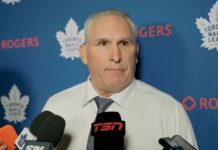

![Craig Berube on Easton Cowan rejoining the Leafs: “He’s given us some really good games… The [demotion] was just a move made for roster reasons, but he’s back” Craig Berube, Toronto Maple Leafs head coach](https://mapleleafshotstove.com/wp-content/uploads/2025/04/berube-craig-leafs-prac-218x150.jpg)
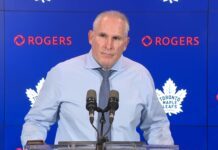










![John Gruden after the Leafs prospects’ 4-1 win over Montreal: “[Vyacheslav Peksa] looked really comfortable in the net… We wouldn’t have won without him” John Gruden, head coach of the Toronto Marlies](https://mapleleafshotstove.com/wp-content/uploads/2025/09/gruden-post-game-sep-14-218x150.jpg)
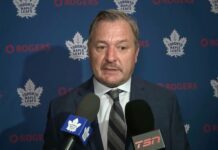
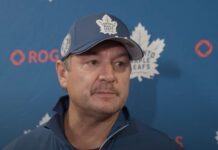






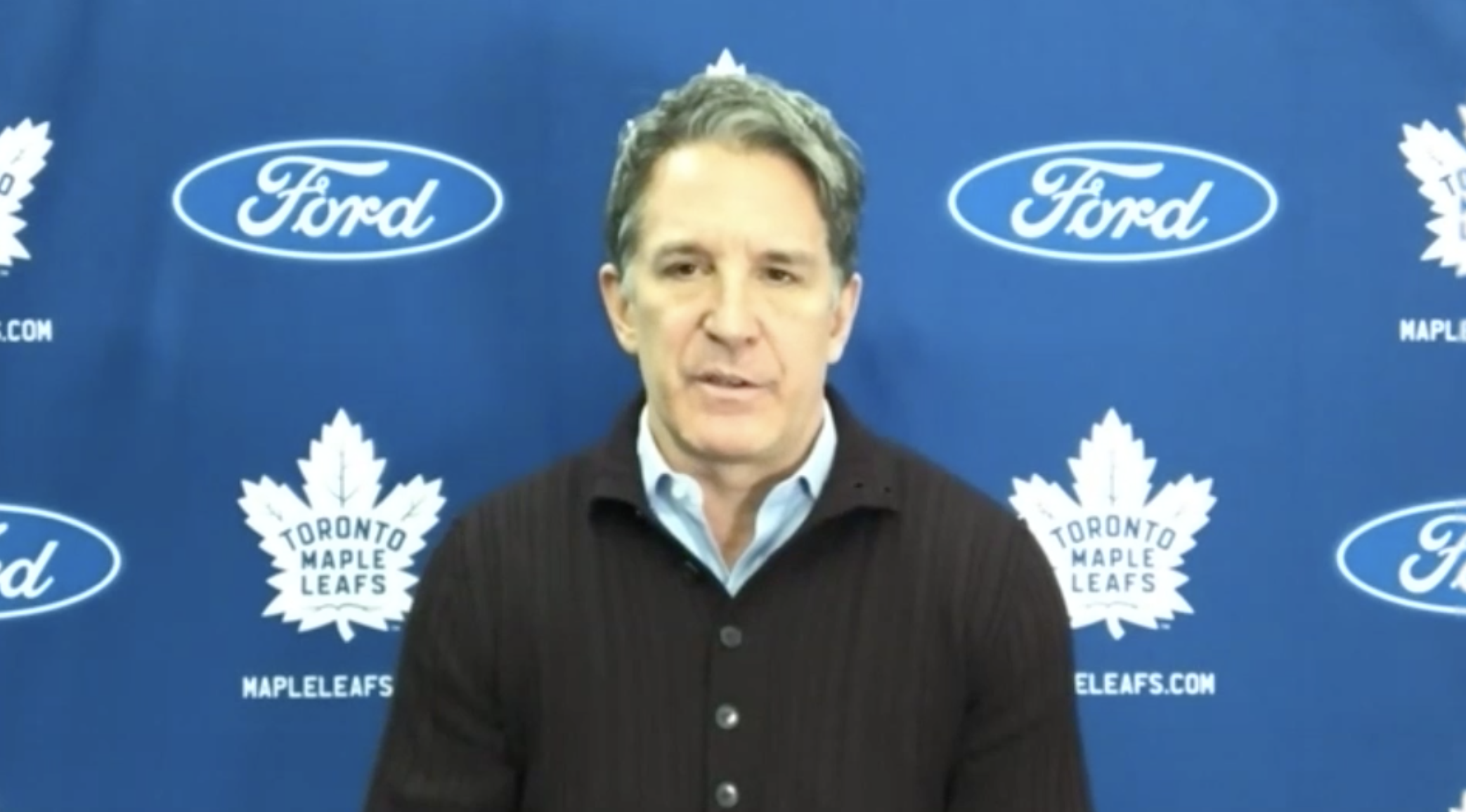
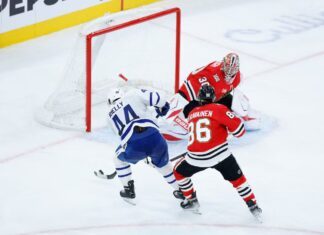



![Craig Berube on Easton Cowan rejoining the Leafs: “He’s given us some really good games… The [demotion] was just a move made for roster reasons, but he’s back” Craig Berube, Toronto Maple Leafs head coach](https://mapleleafshotstove.com/wp-content/uploads/2025/04/berube-craig-leafs-prac-100x70.jpg)




